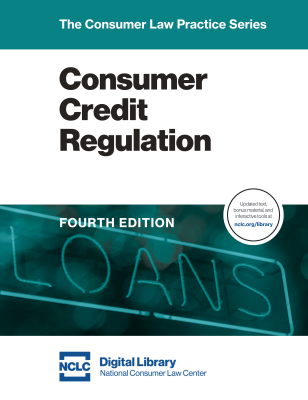High cost payday and auto title lenders have used various imaginative schemes to avoid state usury regulation, including Internet loans, claims of tribal sovereign immunity, and characterizing loans as pawns. As some states and the CFPB impose stricter rules on balloon payment loans, payday lenders are moving into high-cost installment loans and lines of credit. While some states have stronger usury caps for longer term loans, others have loopholes that can be exploited. Some lenders are also reviving the old rent-a-bank model in an attempt to avoid state rate caps.
The CFPB on June 2 has responded with a proposed rule that would place federal limits on many types of high cost small loans, including payday, auto title, and certain installment loans. This article describes the proposal, and then summarizes, first for payday, then auto title, and finally for installment loans, the key issues consumer attorneys need to know, with links to additional information and state-by-state summaries of applicable laws.
The CFPB’s Proposed Rule
The CFPB, under its authority to prevent unfair, deceptive and abusive practices (UDAAP), issued on June 2 a proposed Payday Vehicle Title, and Certain High-Cost Installment Loans Rule, with a comment period ending September 14, 2016. The final rule will be codified at 12 CFR § 1041. The proposed rule language is found on pages 1127 – 1193 of the 1334 page proposal.
The proposal would apply to loans with a term of 45 days or less, and also longer term loans that have an “all-in” annual percentage rate greater than 36% (the “all-in” rate would treat many fees as interest, see § 1041.2(18)). Covered longer term loans also must either be repaid directly from the consumer’s bank account or by payroll deduction (if access is obtained within 72 hours of the loan) or be secured by the consumer’s vehicle. (§ 1041.3(b)) Exempt would be purchase money loans, such as loans to purchase a motor vehicle, credit secured by real estate, credit cards, student loans, overdraft lines of credit, and true pawns. (§ 1041.3(e)).
The core provision in the proposal is that lenders are required to reasonably determine that the consumer has the ability to repay the covered loan. The standards as to ability to repay are detailed, different for short term than longer term loans, and have certain exceptions. In particular, lenders need not follow the underwriting requirements for (1) up to six short-term loans (with either a 30-day gap in between or subsequent loans reduced by one-third), (2) longer term loans with interest under 36% and limited fees. See §§ 1041.4 - 1041.12. The proposal would also impose certain restrictions on making covered loans when a consumer has or recently had certain outstanding loans.
The proposed rule has several other provisions, including:
- When the lender’s attempt to withdraw funds from the consumer’s account fails because of insufficient funds, the lender can only attempt one more such withdrawal, unless it has obtained the consumer’s consent for additional attempts. §§ 1041.13, 1041.14. This provision thus will limit insufficient funds fees assessed to the consumer.
- A number of different disclosure requirements before attempting to withdraw payment from the consumer’s account. § 1041.15.
- A general prohibition against actions intended to evade the rule’s requirements. § 1041.19
There is no private right of action under CFPB UDAAP rules (such as this rule), but a violation may lead to a state deceptive practices or UDAP claim. See NCLC’s Federal Deception Law § 3.8 (2d ed. 2016), updated online.
Current Consumer Tactics to Deal with Payday Lenders
While the CFPB has proposed limitations on future payday loans, it is important to keep in mind tactics consumers may utilize in dealing with current loans. All linked references are to NCLC’s Consumer Credit Regulation, updated online at www.nclc.org/library:
- Payday lenders may violate state law, which may make the loan void or voidable, § 9.3.1. A state by state summary of payday lending regulation is found at § 9.3.
- Internet-based payday lenders should not be able to escape regulation by the consumer’s state of residence, § 9.6.2.
- Tribal payday loans present complicated issues, including those involving sovereign immunity, but state laws do apply to loans made off reservation, § 9.6.3.
- Another attempt (not often successful) to avoid state regulation of payday lending involves structuring the loan as spurious open-end credit, § 9.6.4.
- Payday lenders may even characterize themselves as loan brokers as a means to avoid state payday lending laws, § 9.6.5.
- While other payday lender attempts to evade state regulation are often quite imaginative, they are also often unsuccessful, § 9.6.6.
- Options open to consumers to deal with payday lenders include revoking the payday lender’s authorization to debit the account or stopping payment on a check or EFT, § 9.2.8. or closing a bank account, § 9.2.9.
- Payday lenders may be subject to significant statutory damages for violation of the Electronic Fund Transfers Act, particularly where an Internet payday lender requires consumers to make more than one payment by EFT, § 9.2.1.
- Payday lending to servicemembers or their dependents is likely to violate the federal Talent-Nelson Military Lending Act, § 9.4.1.
- Payday lenders must comply with Truth in Lending Act disclosure requirements, § 9.4.3.
- State UDAP and unconscionability claims against payday lenders may be available, § 9.7.
- Criminal or civil bounced check statutes often have limited applicability when a consumer bounces a payment to a payday lender, § 9.2.3. A lender threatening to or actually using these statutes may be in violation of state law and a third party collector may be violating the Fair Debt Collection Practices Act.
- While a bank may not be liable where a payday lender deposits a post-dated check early, the lender may be liable for state UDAP or breach of contract claims. § 9.2.5
- A consumer’s leverage with a payday lender may also improve by filing for bankruptcy, § 9.9.
Representing Clients with Auto Title Loans
Auto title loans are small loans at high interest rates, usually requiring one lump-sum payment after 30 or 60 days, where the car is pledged as security. Some auto title lenders require the consumer to leave an extra set of keys with the lender. Keys to representing clients are the following:
- Be familiar with the applicable special state auto title pawn law or regulation, adopted by more than half the states. See NCLC’s Consumer Credit Regulation§ 12.5.5 (2d. ed. 2015), updated online, for a state-by-state summary.
- Consider whether disguising the auto title pawn as a leaseback or buyback fails to avoid applicable state law. See Id at § 12.2.
- Determine whether the auto title loan need only comply with a state’s pawn legislation. See Id, at § 12.3.
- Be on the lookout for other schemes to disguise the auto title pawn to evade state usury regulation. See Id, at § 12.4.
- Review whether the lender has a valid security interest and has followed other UCC procedures to repossess and dispose of the vehicle upon default, as briefly summarized at Id, at § 12.5.3 and more thoroughly analyzed at NCLC’s Repossessions.
- Analyze and enforce the federal Talent-Nelson Military Lending Act if the auto title loans are made to servicemembers or their dependents. See Consumer Credit Regulation at § 12.6.
What You Need to Know About Installment Loans
Closed-end non-bank installment loans unrelated to a particular purchase were widespread thirty or more years ago, then went out favor, but are now making a comeback as lenders seek to avoid restrictions on payday loans. Faced with their growing popularity, practitioners must be familiar with the following:
- Existing (and often quite old) state regulation for the relevant jurisdiction, as summarized at NCLC’s Consumer Credit Regulation Appx. D (2d. ed. 2015), updated online.
- Almost all states require non-bank installment lenders to be licensed, and many provide that the loan is void if the lender is not licensed. Id. § 10.8.
- Does the state legislation have a rate cap, what fees are not capped, and how is the interest rate computed? Id. § 10.2.
- Effective October 1, 2016, installment loans to servicemembers or their dependents may violate the federal Talent-Nelson Military Lending Act, which will impose a strict 36% interest rate cap and other limitations. Id. § 10.2.7.
- Federal rate exportation and other forms of federal preemption do not apply to installment loans originated by lenders other than banks. Id. § 10.1.5.
- Look for attempts to evade usury caps through the sale of unauthorized add-ons or excessively priced credit insurance. Id. § 10.3.
- State law may also restrict payment schedules, the loan term, and rebate policies. Id. § 10.4.
- State law may limit late fees and post-maturity interest rates. Id. § 10.7.
- Where an installment lender takes advantage of a high state usury cap, there may be limits on security and collateral. Id. § 10.6.
- Watch out for attempts to evade state closed-end credit regulation by spuriously casting the loans as open-end. Id. § 10.9. State open-end credit statutes are summarized at Id. Appx. E.
To order Consumer Credit Regulation (print and online or online-only), go to www.nclc.org/bookstore.


